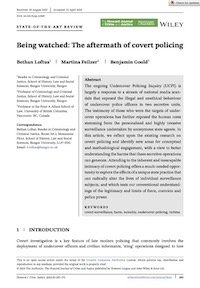By Undercover Policing Inquiry (UK)
The report which this foreword introduces is the first fruit of the work undertaken by the Undercover Policing Inquiry, under the chairmanship of Sir Christopher Pitchford from July 2015 until July 2017, and under my chairmanship since then. It covers the first 14 years, approximately, of the Special Operations Squad (SOS)/Special Demonstration Squad (SDS), a unit of the Metropolitan Police Service (MPS) set up in July 1968 (hereafter referred to as the SDS, unless specifically referring to the SOS). It attempts to set out the history of the unit and to draw conclusions about the purposes for which it was set up and continued, and their justification. The findings of fact and conclusions are mine and mine alone. These findings are based on multiple sources of evidence. As in the case of any historical inquiry, the starting point must be contemporaneous documents created by those who participated in the events being investigated. Sufficient documents from the MPS and public sources have survived to permit reliable findings to be made about the creation of the unit and the purpose it served in 1968. The documentary record then becomes sketchier until November 1974. From then on, Security Service files contain an extensive and substantially complete record of the intelligence gathered by the undercover officers deployed by the unit. I know that different views are held about the lawfulness and propriety of the retention of so much personal information for so long. I do not intend to enter into this debate, but only to make the trite observation that, without this evidence, accurate reconstruction of what occurred would not have been possible. I wish to express my gratitude to the Security Service for the collation and production of these files. Flesh was put on the bones of the documentary material by evidence given by surviving former undercover officers and their managers, and by members of the public with whom they interacted. As will be apparent from the content of this report, their evidence was, almost without exception, of significant value in enabling me to understand what had occurred, in particular about matters such as personal relationships, which were not documented. I acknowledge the inconvenience, at best, which the provision of this evidence has caused to them. I am grateful to all of them for the trouble they have taken to assist me in my task
Undercover Policing Inquiry (UK), 2023. 120p.




